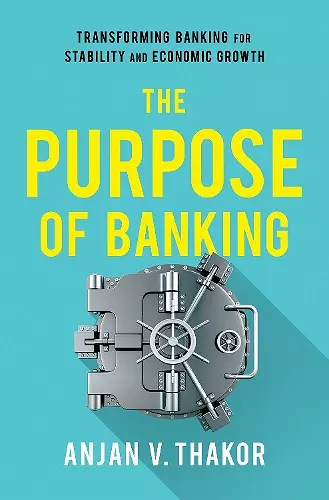The Purpose of Banking
Transforming Banking for Stability and Economic Growth
Format:Hardback
Publisher:Oxford University Press Inc
Published:22nd Aug '19
Currently unavailable, and unfortunately no date known when it will be back

Banks and other financial institutions play a fundamental and yet divisive role in the health of any economy. As lenders they are important to everyone seeking a mortgage or a car loan. As investors they are essential gears of economic progress. And yet when crises hit and the economy tumbles, they are vilified. Is it possible for the banking and financial sectors to both be crisis-free and sustain economic growth that benefits everyone? This is the central question that Anjan Thakor, one of the leading analysts of banking and financial institutions, takes up in this insightful overview of the purpose of banking. He starts with the foundations of banks as safe-keepers of assets and providers of liquidity crucial to a dynamic economy. They manage risk, monitor borrowers, create trust, are providers of information, and facilitate innovation. And yet notwithstanding these essential purposes, the reputation of banks has suffered tremendously in the wake of crises that have harmed the financial sector, the real economy, and many people. The reason, Thakor argues, is that banks have lost sight of their higher purpose, which is tied to their role as safe-keepers of assets and creators of value. These essential economic functions should drive banks' culture, capital structure, and customer relationships. Credit ratings cannot replace relationships, leverage is no substitute for judgment, and the pursuit of profit should not come at the expense of prudence. Thakor shows that while governments can play an important role in creating the environment of banks, including through microprudential and macroprudential regulation, ultimately it is up to banks to improve their culture and align it with their purpose in society.
The author, Anjan Thakor, provides a comprehensive, cogent, and accessible analysis of the issues with a narrative grounded in academic research. Along the way, he provides the reader with a deeper understanding of the core functions of banking, often by using intuitive and fun historical analogies. While reading, it became quite clear to me why the author has been such a prolific banking scholar and decorated teacher. * W. Scott Frame, Business Economics *
Aworld-renowned banking expert, Anjan Thakor takes us through a fascinating tour of the banking industry from its very beginnings in Ancient Rome to the ideal bank of the future. If you've ever wondered why banks exist and whether fintech will make them obsolete, this book is for you. * Andrew Lo, Charles E. and Susan T. Harris Professor, MIT Sloan School of Management *
It is refreshing to have one of banking's most prolific and insightful scholars remind us of a time-honored touchstone of business: authentic leadership requires unselfish,or at least oblique, behaviors. Culture may be the softest of organizational assets, but it is also the most trenchant. Thakor makes a compelling case for these bedrock ideas. * Stuart I. Greenbaum, Former Dean and Professor Emeritus, Olin Business School, Washington University of St. Louis *
Anjan Thakor is one of the most knowledgeable scholars of banking in the world. This expertise is on full display in this book. He shows how a banking system can be designed to balance financial stability and economic growth. It is essential reading for all those with a serious interest in banking. * Franklin Allen, Imperial College London *
ISBN: 9780190919535
Dimensions: 163mm x 234mm x 23mm
Weight: 476g
248 pages